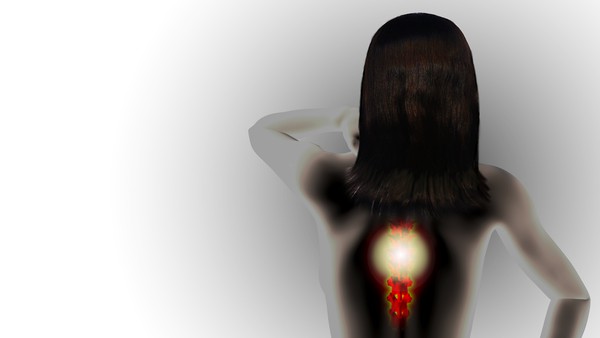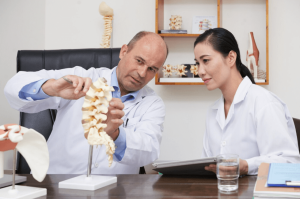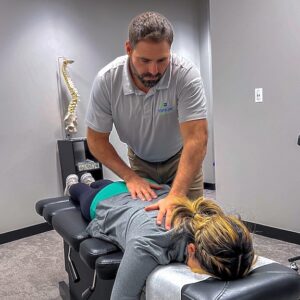Patients often come into one of our offices complaining of pain caused by Degenerative Disc Disease (DDD). They’re in pain and want to know is Chiropractic Care can help.
In our experience, the answer is definitely yes. And, in this article we’ll break down exactly what DDD is, what causes it and the care options available – including chiropractic care.
Degenerative Disc Disease (DDD) is most prevalent among aging adults. Its symptoms include back pain that gets worse when seated, lifting or twisting. You also may feel numbness and general muscle weakness in the legs. Despite its name, Degenerative Disc Disease is not actually a disease but a condition, and chiropractic care can often deliver incredible outcomes through its holistic, non-medical and non-surgical approach.
Patients often visit our office complaining of pain caused by DDD. They’re looking for real answers and want to know: can a chiropractor help with degenerative disc disease? In our experience, the answer is yes. Our chiropractic care offers a holistic, non-surgical approach focusing on spinal disc alignment and overall health.
What is Degenerative Disc Disease?
From the name, the condition refers to the damage or deterioration of the discs between your spinal vertebrae.
Often, spinal discs start to wear out as you age. It happens to most people. In the case of DDD, however, there is rapid and severe damage in the process leading to pain.
Spinal discs are rubbery like cushions between your back bones (spinal vertebrae), and they help with support, flexing and shock absorption. When the cushions wear out, your backbones sink and, in the process, press against the nerves that traverse the spaces between them. Anything that touches the nerves can cause immense pain.
In youth, discs have a high water content and strong elasticity, which helps them act as cushions between the vertebrae. As aging occurs, water content diminishes and elasticity decreases, making the discs more prone to injury and leading to spinal degeneration.
The phases of degeneration often move from mild dryness to severe disc collapse. A bulging disc may eventually lead to nerve impingement, causing widespread pain and loss of mobility.
What Causes Degenerative Disc Disease?
Old age is the most significant cause of wear and tear in spinal discs. However, not every older adult has or gets DDD. Certain risk factors make some people prone to the condition. Understanding these causes can help you stay healthier and take better control of your health.
Disc desiccation:
When your spinal discs dry out, you can only expect that they will become thinner and unable to cushion your vertebrae properly. Discs dry out as we age. However, when you throw frequent dehydration and smoking into the mix, the result can sometimes be degenerative disc disease.
Obesity:
Your back does a lot of work that involves carrying your body’s weight. When you gain weight, you put more pressure on your spinal vertebrae. In effect, the spinal discs get squeezed and forced into desiccation and deterioration.
Accidents and trauma:
Just like many other back conditions, DDD can result from a trauma or injury that leads to swelling or soreness of back muscles, or the dislocation of the spinal discs or vertebrae. The damage could be from sports, manual labor or falls and auto accidents.
Weak bones and muscles:
Your back needs strength for the myriad of motions it gets put through every day. If there is a weakness in your bones and muscles, the resultant inflexibility can severely affect the discs. Weaker discs have the highest risk of slipping out of place, tearing or cracking. Regular cardio and strength training is the path to a healthy back.
Lifestyle factors:
Lifestyle choices can dramatically impact spinal health as well. Poor habits can reduce the spine’s ability to maintain healthy discs, leading to faster degeneration. These include:
- Smoking: Smoking impairs blood flow, restricting oxygen and nutrients from reaching the discs. Without proper nourishment, discs dry out, weaken and become more prone to damage.
- Diet: A poor diet lacking in essential nutrients like vitamins D and C, calcium and omega-3 fatty acids can hinder spinal repair mechanisms and weaken the supportive tissues around the spine.
- Sedentary Habits: Sitting for extended periods reduces spinal fluid movement, decreasing disc hydration and flexibility. This lack of movement also weakens the muscles that protect and stabilize the spine.
- Poor Posture: Slouching or maintaining improper alignment strains the discs and supporting ligaments, creating additional stress that accelerates disc wear.
Making healthy choices – such as staying active, eating a balanced diet and quitting smoking –can help slow the progression of DDD and protect the spine’s long-term function.
What are the Symptoms of Degenerative Disc Disease?
Symptoms of disc degeneration include mild to severe pain and immobility.
While the condition starts in the spine, over time, the pain caused by DDD could spread to other areas of the body. On most occasions, you will feel pain that starts from the back and radiates to your lower extremities.
Other Degenerative Disc Disease (DDD) symptoms watch out for:
- Stiff back
- Pain when sitting, bending, lifting or standing for long
- Tingling or burning sensation
- Numbness in your legs
- Reduced mobility
- Sciatica, which is a pain in your lower back, hips and legs due to bone pressure on the sciatic nerve that runs from the lower back to the feet

How Can Chiropractic Care Help with Degenerative Disc Disease?
Chiropractic care is an alternative form of medicine that involves healing without surgery or pharmacological intervention. The treatment relies on evidence-based techniques that not only achieve wellness but also improve the quality of life.
Chiropractic care techniques for degenerative disc disease may include:
- Spinal manipulation and decompression
- Joint mobilization
- Massage and soft tissue manipulation
- Rehab and exercise
- Physical treatment with ice, heat, ultrasound or laser
- Nutritional counseling
Disc degeneration causes pain and difficulty moving because the bones of the spine get in the way of nerves. Chiropractic care for disc degeneration disorder includes applying techniques that help to rectify herniated discs and realign your vertebrae so that no backbones press against the super-sensitive nerves.
In the diagnosis stage of degenerative disc disease care, a chiropractor will assess the details of the condition, your symptoms and your past medical history. They will then carry out a physical exam and sometimes take a set of X-rays.
This in-depth diagnosis reveals the location and extent of damage and helps the doctors decide the best chiropractic treatment approach for your condition.
Chiropractic Treatment and Care for Degenerative Disc Disease Involves:
Manual spinal manipulation:
The chiropractic doctor will identify problematical joints and realign them physically using a gentle thrusting force on your back. This manipulation helps to relieve pressure on the nerves between your spinal vertebrae.
Flexion-distraction:
If your degenerative disc diseases are a result of compressed vertebrae, your chiropractor may perform a non-invasive stretching technique on your back using a motorized table. It is a gentle and non-thrusting technique that corrects herniated discs.
Massage therapy:
Chiropractic massage therapies are deep tissue rub downs that aim to improve circulation and range of motion in the affected parts. The treatment also helps to reduce inflammation and achieve pain relief.
Chiropractors have many methods for dealing with DDD. Chiropractic care works to address both the symptoms and root causes of DDD through a combination of targeted techniques:
- Spinal Manipulation: A chiropractic professional applies controlled force to specific joints to improve mobility and alleviate nerve pressure.
- Flexion-Distraction: This gentle stretching method can relieve compression and is especially helpful for disc-related problems like a bulging or herniated disc.
- Spinal Decompression Therapy: A specialized approach that uses a motorized table to carefully stretch the spine, creating negative pressure to retract damaged discs and relieve pressure on nerves.
- Massage Therapy: Improves circulation and reduces muscle tension, enhancing overall spinal health.
- Physical Therapy: Complementary exercises that build strength, improve posture and protect against future disc damage.
A personalized degenerative disc disease treatment plan may combine multiple therapies for the best outcomes.
Chiropractic Care vs. Surgery for Degenerative Disc Disease
Surgery is a common recommendation for severe cases of DDD.
While we don’t believe spinal surgery is never a reasonable option for people with severe DDD, it is invasive and may involve artificial disc replacement or fusion with the help of bone grafting.
Surgery for degenerative disc disease also carries risks such as infection, damage to your spine and nerves, pain and inflammation in the legs. And, it’s important to remember that recovery after DDD surgery may take several weeks to several months.
Chiropractic care for degenerative disc disease is different from surgery because it is non-invasive. Chiropractic therapy does not involve opening up your body. The treatment does not lead to risks or complications and healing happens much faster. There is generally no “recovery time” following a chiropractic adjustment.
The treatment costs are also lower.
In severe cases, surgery may be considered when conservative care no longer offers relief. However, it’s worth weighing the pros and cons:
- Chiropractic Pros: Non-invasive, cost-effective, minimal downtime.
- Chiropractic Cons: May not correct extreme structural deformities.
- Surgery Pros: Potential immediate relief from serious nerve compression.
- Surgery Cons: Higher risk, significant recovery time and no guarantee of long-term success.
Some patients also benefit from spinal decompression as a conservative alternative to surgery, targeting nerve impingement without invasive procedures. Pre- and post-surgery chiropractic programs can help maintain spinal health, improve mobility and minimize the chances of future damage.

Chiropractic Care vs. Medication for Degenerative Disc Disease
The medicine for degenerative disc disease is a group of drugs called Nonsteroidal Anti-inflammatory Drugs (NSAIDS). They help with pain relief, but they don’t achieve true healing. It’s a Band-Aid solution to the problem. NSAIDs are also a risk for the elderly. These drugs can cause severe gastrointestinal complications, strokes, heart attacks and even deaths in cases of prolonged use.
Degenerative disc disease chiropractic care is non-medical; there are no pills or injections. The treatment is focused on whole-body healing, as opposed to masking the pain. With chiropractic therapy, patients do not develop severe complications, as is the case with pharmacological intervention.
Some patients choose to use medications briefly for severe flare-ups while beginning chiropractic therapy, but long-term reliance can be risky.
Chiropractic adjustments target the root cause of back and neck pain, working to restore healthy motion and prevent future degeneration. With chiropractic care, patients can avoid many of the side effects linked to long-term medication use.
Addressing DDD holistically can also help prevent associated issues like spinal stenosis, which occurs when narrowed spaces in the spine put pressure on nerves.
We believe that care from a chiropractic professional isn’t just about managing pain – it’s about promoting full recovery and protecting your spine for the future. Our goal with every spinal adjustment is to help out patients find relief naturally.
Conclusion:
At Evolve Chiropractic, our goal is to improve the health and quality of life for all residents of Huntley, Illinois. Our techniques are backed by medical knowledge and supported by technology. Let’s help you find relief from degenerative disc disease.
Contact us to set an appointment.





